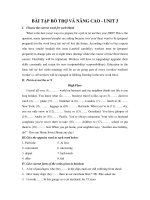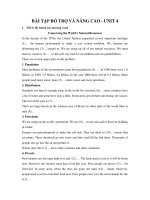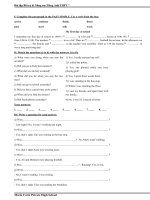Bài tập bổ trợ và nâng cao tiếng anh pptx
Bạn đang xem bản rút gọn của tài liệu. Xem và tải ngay bản đầy đủ của tài liệu tại đây (97.64 KB, 7 trang )
UNIT 4
I. Fill in the blank one missing word
Conserving the World’s Natural Resources
In the decade of the 1970s, the United Nations organized several important meetings (1)
… the human environment to study a very serious problem. We, humans are destroying
the (2)… around us. We are using up all of our natural resources. We must learn to
conserve (3)… , or life will very bad for our children and our grandchildren.
There are several major parts to this problem
1. Population
Most problems of the environment come from population (4)… . In 1990 there were 1.6
billion, in 1950, 2,5 billion, 4,4 billion. In the year 2000 there will be 6.3 billion. More
people need more water, more (5)…, more wood, and more petroleum
2. Distribution
Scientists say there is enough water in the world for everyone, (6)… some countries have
a lot of water and some have only a little. Some areas get all their rain during one season.
The rest of the year is (7)…
There are huge forests in the Amazon area of Brazil. In other parts of the world there is
only (8)…
3. Petroleum
We are using up the world’s petroleum. We use (9)… in our cars and to heat our building
in winter.
Farmers use petrochemicals to make the soil rich. They use them to (10)… insects that
eat plants. These chemicals go into rivers and lakes and kill the fish there. Thousands of
people also go into the air and pollute it.
Winds carry this (11)… air to other countries and other continents.
4. Poverty
Poor farmers use the same land over and (12)… . The land needs a rest so it will be better
next. However, the farmers must have food this year. Poor people cut down (13)… for
firewood. In some areas, when the trees are gone, the land (14)… desert. However,
people need wood to cook their food now. Poor people can’t save the environment for the
(15)…
This is not a problem for one country or one area of the world. It is a problem for all
humans. The people and the nations of the world must work together to (16)… the
world’s resources.
II. Choose the word or phrase which best completes each sentence
1. Firemen rescued several people from the … floor of the blazing building
A. high B. top C. basement D. low
2. When the electricity failed, he … a match to find the candles
A. rubbed B. scratched C. struck D. started
3. He filled in the necessary forms and … for the job
A. appealed B. asked C. requested D. applied
4. She is traveling to work by train today because her car is being …
A. stopped B. broken C. serviced D. rented
5. The film lasted three hours with … of 15 minutes between part one and part two
A. an interval B. a pause C. a stop D. an interruption
6. I’m very busy at the moment so it may take a … time to answer your letters
A. little B. few C. small D. some
7. He was wearing a heavy overcoat to … himself against the cold
A. conceal B. protect C. cover D. wrap
8. It took Michael a long time to find a pair of shoes that … him
A. liked B. fitted C. agreed D. matched
9. … the traffic was bad, I arrived on time
A. Although B. In spite of C. Despite D. Even
10. He was unwilling to explain the reason … his absence
A. for B. why C. of D. that
III.Put the verbs between brackets into their correct form. Notice any alternatives that
might give a different meaning
1. (make) the same mistake twice is unforgivable
2. (write) short stories requires great talent
3. There are many ways of (solve) this problem
4. We should eat (live), not live (eat)
5. She left the room without anyone (see)
6. His (take) ill was quite unexpected
7. Mary is sure (pass) her examinations
8. It’s a pleasure (be) with you
9. I don’t want you (mention) my (arrive) late
10. The police suspect him of (try sell) stolen goods
11. I remember (hear) him (say) the grass needed (cut)
12. Can you manage (finish pack) these parcels alone?
13. “I’ve always loved (act)”, “I’d love (see) you (wear) a Roman toga and (recite)
Shakespeare”
14. After (get like) English through (hear) it on the radio, he finished by (study) it
15. We considered (give) her a book for her birthday, but couldn’t help (buy) her some
flowers, too
16. Our teacher has promised (help) us (prepare) for the examinations which he has put
off (hold) till next week
IV. Complete new sentences without changing the meaning of the two original
sentences given
1. He was foolish. He left such a good firm
He was
2. You want to ask for more money. You would be stupid if you don’t
You would be
3. Ring me letter. Would you be so good?
Would you
4. Open the window. Would you be good enough?
Would you
5. He worked out answer. It was clever of him
It was
6. They don’t take any part in local life. It’s silly of them
It’s
7. We can’t refuse their invitation. It would look rude
It would
8. He’s eager. He wants to help us in any way he can.
He’s
V. Choose one of these infinitive phrase to complete the passage
to recognize
to give
to run away
to have
disturbed
to please
to help
as to help me
to move
to see
to send
The brave old lady and the hopeless crook
Mrs. John, a 75-year-old widow, woke up with a start. Peering into the darkness, she
was astonished (1)… a man in her room. It was easy (2)… he was a burglar. At first, she
was too afraid (3)… . Then she plucked up her courage and said, “We must talk about
this over a cup of tea. Would you be so kind (4)… downstairs?”. To her surprise, the man
meekly obeyed. He was eager (5)… and anxious (6)… the old lady. He prepared the tea
and said he was sorry (7)… her. He was too frightened (8)… . After a cup of tea, he said
he would be glad (9)… Mrs. John his name and address and left empty-handed. Of
course, Mrs. John said informed the police, who commended her for her bravery. Later,
during the trial, the judge said it was his duty (10) … the man to prison, describing him as
the most incompetent burglar he had ever met!
VI. Complete each blank space with the correct word from the list given. Use each
word only once.
abundant (adj)
perform (v)
intriguing (adj)
investigate (v)
assumption (n)
survive (v)
support (v)
similar (adj)
arise (v)
theory (n)
1. A human being can … without food or water for several days but will die within
moments without air
2. The police always … murders and robberies to try to find out who committed the
crimes so that they can arrest the criminals
3. Water is … in many places, but it is rare in deserts
4. In 1916, an astronomer named Percival Lowell had a … that there were a ninth
planet, but Pluto was not discovered until 1930
5. When Pat opened a letter from the college she had applied to, she began to cry. Susan
was watching her and made the … that the news was bad. Her guess was correct: Pat
was not accepted to the college
6. Many students do not … well on examinations because they become very nervous
and tense
7. Mary suggested a two-month camping trip to the Himalayas next summer. Her
husband Tom thought the idea was … . They had never done anything so exciting
before!
8. Venus and Earth are … in size. However, the surface temperature of Venus is 600
degrees Fahrenheit!
9. It is probably impossible for life to ever … on Venus because of its intense surface
heat.
10. When Maria attends college next semester, her parents agreed to … her, so she will
not have to work.
VII. Supply the best words in the blanks of these sentences
1. Our hen’s just (lay/ laid)… an egg.
2. Let’s (lie/ laid) on the grass
3. How long have you been (lying/ laying)… there?
4. I’d like to (live/ life)… in the country.
5. Don’t (loose/ lose)… your tickets!
6. What time did you (live/ leave)… home
7. Did you hear that (aloud/ loud) … sound?
8. Don’t talk so (loud/ aloud) … !
9. (maybe/ may be) … they’re out
10. Take (of/ off) your coat.
VIII. In each of the following sentences, four words or phrases have been
underlined. You should choose the one word or phrase that would not be
appropriate in standard written English. Circle your choice
1. The average age (A) at which people (B) begin to need eyeglasses (C) vary (D)
considerably
2. (A) Generally regarded (B) as distinct continents. Europe and Asia are (C) simply
vast (D) geography divisions of a larger land mass.
3. The (A) specific gravity of the water in the great Salt Lake is (B) too great that one
cannot sink or (C) completely (D) submerge in it
4. One of the most distinctive features of humans (A) is (B) surely the ability (C) to do
and use (D) sophisticated tools
5. (A) It has been known for (B) the last two centuries that lightening (C) was (D) a
form of electricity
6. The intention of environmentalists (A) is (B) to protect the (C) disappearing spotted
owl with the least (D) disruptive to the lumber industry
7. The common notion (A) that fish is an excellent food (B) improving brain is not (C)
supported by any (D) scientific information
8. Intense (A) clearing of the forest (B) over decades has destroyed the owl’s habitat and
(C) threatened (D) their survival.
IX. Give the correct form of the world in brackets
1. John Jameson is a famous (crime) … who stole five million pounds from a bank
2. (Manage) … your own business can cause a lot of financial worries
3. The surgeons tried their best to save his life, but unfortunately the operation was
(success)…
4. I understand (perfect)… what you are saying
5. Jane’s (appoint)… as director came as no surprise
6. A holiday in America can be …. cheap (surprise)
7. My colleagues are very pleasant, but the manager was a little (friend)…
8. I (sleep)… this morning, and was late for school
X. Read this funny passage
The best swimmer
An American and an Englishman were telling each other about wonderful things
which each of them had seen with own eyes. The number of stories they had told each
other, many of which were, of course, not true, was becoming greater and greater when at
last the American said:
“When I crossed from France to England, a man jumped into the water as a boat was
leaving. He swam in front of the boat all the way and had arrived at Dover before we did!
I am sure you never saw such a splendid swimmer!”
The Englishman looked at the American and said calmly, “Is that so? Well, I was the
man”.
ANSWER FOR UNIT 4
I. 1. on 2. world 3. them 4. growth 5. food 6. but
7. fry 8. desert 9. it 10. kill 11. polluted 12. over
13. trees 14. becomes 15. future 16. conserve/ save
II. 1B 2C 3D 4C 5A 6A 7B 8B 9A 10A
III. 1. to have made 2. writing 3. solving 4. to live, to eat
5. seeing 6. being taken7. to pass 8. to be
9. to mention, arriving10. trying to sell 11. hearing, say, cutting
12. to finish packing13. acting, to see, wearing, reciting
14. getting to like, hearing, studying 15. giving, buying
16. to help, prepare, holding
IV.1. He was foolish to leave such a good film
2. You would be stupid if you don’t ask for more money
3. Would you be good to ring me later?
4. Would you be good to open the door?
5. It was clever of him to have worked out the answer
6. It’s silly of them not to take part in local life
7. It would look rude if we didn’t accept the invitation
8. He’s eager to help us in any way he can
V. 1. to see 2. to recognize 3. to move 4. as to help me
5. to help 6. to please 7. to have disturbed 8. to run away
9. to give 10. to send
VI. 1. survive 2. investigate 3. abundant 4. theory
5. assumption 6. perform 7. intriguing 8. similar
9. arise 10. support
VII. 1B 2A 3A 4A 5B 6B 7B 8A 9A 10B
VIII. 1C 2D 3B 4C 5C 6D 7B 8D
IX. 1. criminal 2. managing 3. unsuccessful 4. perfect
5. appointment 6. surprisingly 7. unfriendly 8. overslept









